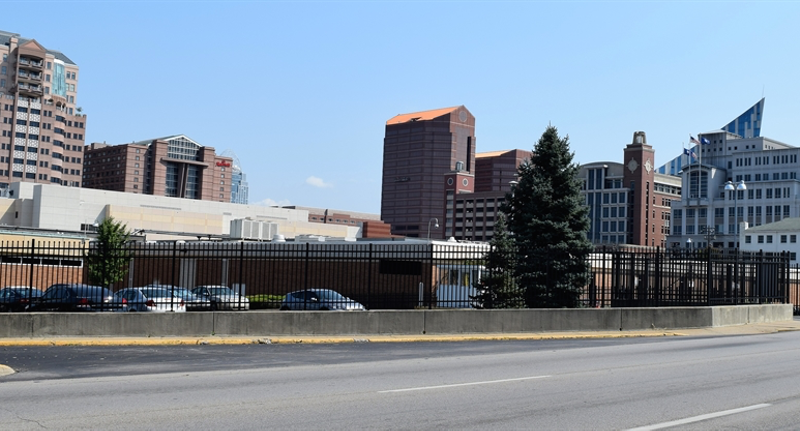
Hello Cincy. We haven’t done a weekly news roundup in a while, and this was a pretty eventful week. So let’s review, shall we?
The big news out of Cincinnati City Hall this week is that city council took what will likely be its final vote on FC Cincinnati’s West End stadium, at least for now. Council voted to approve zoning variances needed for the stadium’s construction yesterday, paving the way for final approval from the Cincinnati Planning Commission as the team races to finish its facility before the start of Major League Soccer's 2021 season. Council's vote happened only after a last-minute, $1 million agreement between the team and the Cincinnati Ballet, as well as another, smaller agreement between FC Cincinnati and Monica Williams, the owner of displaced West End restaurant Just Cookin’. Council also voted to provide $75,000 to help Williams find a new location for her business, which had been in the planned footprint of the stadium. Read more about the deal in our story here.
• The city has likely settled a lawsuit brought by conservative activist Mark Miller seeking the text messages of five Democratic Cincinnati city council members during the tumultuous departure of former City Manager Harry Black last spring. Hamilton County Judge Robert Ruehlman this week set a March 7 hearing to discuss that settlement and determine if texts sent between any combination of the five — Tamaya Dennard, Greg Landsman, Chris Seelbach, P.G. Sittenfeld and Wendell Young — should be released. Ruehlman in the past has said he believes they should be made public. You can read more about the case in our story here.
• Also happening in City Hall: Council member P.G. Sittenfeld has proposed making election day — the first Tuesday after the first Monday in November — an annual paid holiday for city workers. Sittenfeld’s proposal is patterned after a similar law recently passed in Sandusky. About 58 percent of eligible Hamilton County voters turned out for the 2018 elections, the ordinance notes. Supporters hope the ordinance will influence other local employers to give their employees a day off to cast a ballot, boosting voter turnout.
• Can an effort to bring a cooperative market to grocery store-less Northside persevere? That’s the question supporters are asking themselves after a large portion of the effort’s funding fell through late last month. Part of the problem? About $1.5 million of that money relied on New Market Tax Credits devalued by the 2017 GOP tax reforms. The five-year effort had millions in funding lined up and was poised to begin getting quotes from contractors on renovations to the former Save-A-Lot location that was to be the market’s home when the news dropped. Now supporters are looking for ways to keep the project going. You can read more in our story here.
• The Metropolitan Sewer District is rolling out a new plan to help elderly customers who can’t afford their sewer bills, but some activists say the aid should be broader age-wise and deeper discount-wise. MSD’s Customer Assistance Program will offer a 20-percent discount to low-income seniors. But Communities United for Action, which advocates for low-income residents, says other sewer districts offer a 40-percent discount. They say the CAP program also won’t serve many low-income people struggling to pay rising sewer rates. You can read CityBeat intern Seth Weber’s story on CAP here.
• Let’s venture across the river to an interesting new idea happening in Covington. The city is holding at least 23 small dinner parties to gather citizen input on development potential for the city’s massive IRS site. The federal government will be pulling out of the riverfront location in fall 2019, taking about 1,600 jobs with it. That leaves the city with the heavy task of figuring out what to do with the oddly-shaped, 23-acre site. To help determine that, city officials are asking citizens to weigh in. To that end, Civic Dinners, a community engagement firm tapped by city-hired consultant Cooper Carry, will help facilitate the dinners, during which “6-10 diverse guests” will mull three big questions about the site. It’s not the only way Covington is seeking input, but it’s a novel one. Civic Dinners has facilitated similar public input efforts in places like Atlanta and Auckland, New Zealand.
"It's actually a lot less intimidating than it sounds," Covington Economic Development Director Tom West said in a news release. "Dinners like these haven't been used in a formal way around here before, but they're a different and creative way to encourage the public to participate in a meaningful way. These are just focused dinner parties, and I've found that people in Covington like to engage."
You can sign up to attend — or host — one of the parties here.
• Back to Ohio, where Gov. Mike DeWine this week proposed a big hike to the state’s gas tax to pay for badly-needed highway, road and bridge maintenance. DeWine’s plan, which is subject to approval by the Ohio General Assembly, would raise the state’s gas tax from 28 cents to 46 cents. Not everyone is sold on the proposal, which would index the tax to inflation. Some Democrats point out that as a sales tax, the increase will hurt low-income people proportionally more than others, and also note that DeWine campaigned on charges that his opponent, Democrat Rich Cordray, would raise taxes and that he himself would not. You can read the details of DeWine’s plan in our story here.
• Finally, hate groups are on the rise in Ohio and Kentucky, according to the Southern Poverty Law Center. The group tracked 36 such groups in Ohio last year, according to a report SPLC released this week — up from 31 the year prior. Kentucky had 13 groups that denigrate people based on skin color, religious beliefs, sexual orientation or other characteristics, SPLC says, up from 11 last year. The number of such groups actually decreased in Indiana, according to SPLC. You can read more about the report in our story here.





